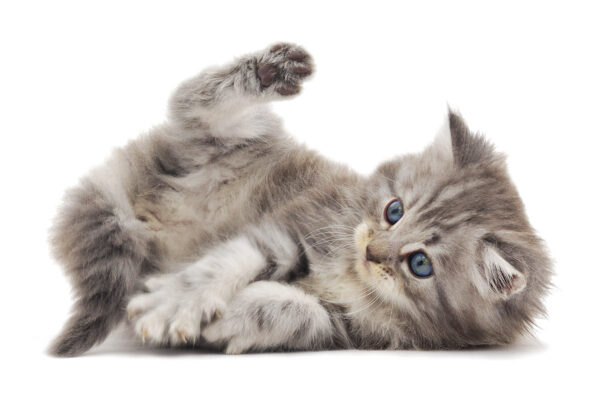Kitten Care
It is a great joy to introduce your new kitten to your family. This kitten care guide will ensure your furry friend’s wellbeing.

A well cared for kitten will grow to be your companion for many years. Having a cat as part of your family is also a big responsibility as it will be totally dependent on you for shelter, food, education and good health.
Shelter
Your kitten needs a place of its own. Provide a clean box or basket in a warm, draft-free area. Soft, washable bedding will help make your kitten cosy.
Feeding
Initially feed the kitten what it is used to being fed. Gradually change to the diet you want it on. A high quality kitten food such as Delicate Care or Ziwi Peak will ensure that all your kitten’s nutrient requirements are met. To help maintain healthy teeth and gums feed pieces of raw meat regularly. Remember that meat only is an inadequate and unbalanced diet for a cat of any age.
Ensure access to fresh water at all times. Milk (Pet’s Own, Pet Plus) can be offered to kittens.
We can develop with you the right nutrition plan for your kitten; taking into consideration breed, lifestyle, age and budget.
Vaccination
A complete vaccination programme at 6, 12 and 16 weeks (or as advised for your kitten) is vital to ensure protection against the potentially fatal disease, Feline Enteritis, and the highly contagious disease, Cat Flu. Where necessary we also offer vaccination to protect against Feline Leukaemia and Feline Aids.
Our recommended ongoing vaccination protocol will be according to lifestyle and individual requirements to provide important protection but also to limit unnecessary vaccine triggers for the immune system.
Worming
Kittens are commonly infected with worms and heavy burdens can cause severe problems. Worm your kitten at 6, 8 and 12 weeks, then every 3 months thereafter with a broad-spectrum wormer. Weigh your cat first to ensure correct dosage. We are happy to weigh your kitten for you and administer the tablets, if you buy them from us. We recommend an Allwormer, which will eliminate roundworm, hookworm and tapeworm. We can supply this for you to use at home. We also recommend routine faecal tests to avoid unnecessary worm products.
Remember roundworm and hookworm can be transmitted to humans, especially children, resulting in severe illness.
Teething
The kitten’s permanent (adult) teeth will start to erupt from 14 weeks of age. The process is usually complete by 5-6 months of age. Occasionally the temporary (baby) teeth are retained. If this happens we advise that they be removed under a general anaesthetic, preferably at the time of desexing. Provide your kitten with things to gnaw on, such as raw bones (eg. a chicken wing or neck), large pieces of meat or use Hill’s t/d dry food to help maintain clean teeth.
Desexing
Desexing is recommended for every cat not intended for breeding; to prevent unwanted kittens and to help prevent urine spraying, roaming, fighting and the risk of AIDs in males. A neutered animal will avoid potential problems such as difficult births, infections of the uterus, cancers of the mammary glands or testicular cancers. We advice desexing all kittens at 6 months of age.
Toilet Training
Toilet training should begin as soon as the kitten comes to its new home. Supply your kitten with a litter tray and ensure the litter is always kept clean. If your kitten is confined to a small room at night, put the tray in the corner farthest from its bed and away from its food. Kittens are naturally clean and rarely make mistakes. If an accident occurs, punishment will confuse the kitten unless it is actually caught in the act.
Fleas
The important thing to remember about the flea is that most if its life cycle is spent off the cat; hence you may not see fleas on your cat but will still need to treat for them. We recommend and sell the monthly spot-on preparations and can advise you what is best for your kitten. Treat all dogs and cats in the household, every month of the year.
Be very careful with flea products and make sure they are suitable for cats. ALWAYS follow the directions carefully as cats can be easily poisoned by misuse of insecticides.
Warning: Some oral and topical products freely available in Australia are under investigation in Europe; as they have caused sudden deaths in sensitive cats. We always recommend the safest but effective treatments and are always up to date with the newest research.
Grooming
Daily brushing is recommended to keep your cat’s coat shiny and healthy, especially if it has medium or long hair. Get your kitten accustomed to being brushed and combed, especially under the chin and armpits, on the belly and behind the ears. If long-haired cats are not brushed regularly large matts may form which can be very difficult to remove; necessitating clipping which may need to be done under a general anaesthetic.
Exercise and Play
Provide your kitten with safe play things that can’t get tangled or be swallowed inadvertently. A scratching post or scratching pad will save your carpet and furniture. Always supervise young children when they are playing with kittens, as they can be quite rough and young animals can be easily injured.
Other pets
It may take some time for your kitten to be accepted by other cats or dogs in the household. Introduce them under supervision. Make sure your other pets still receive plenty of attention. Ensure that bird cages are kept well out of reach and that fish tanks are kept covered. Feliway or Rescue Remedy can help with the transition.
Confinement
Cats should be kept indoors after dark, to prevent straying, killing of native fauna, car accidents and fighting (leading to wounds, abscesses and spread of FIV – Cats AIDS). If your cat hunts birds or native fauna, an elasticised collar with bells should be worn.
Microchip & Registration
To allow you and your cat to be re-united if it strays, all cats should be microchipped before you get them (if not, have this done immediately) and must be registered by six months of age. An identification tag may also be attached to your cat’s collar.
